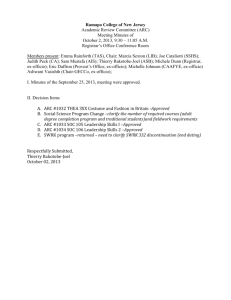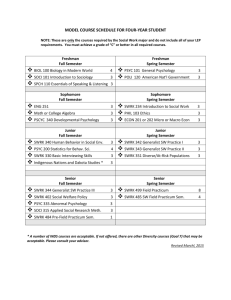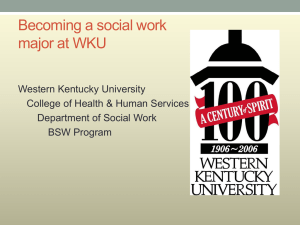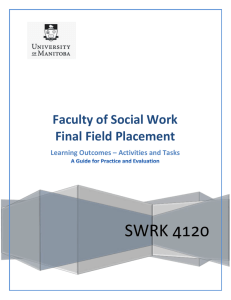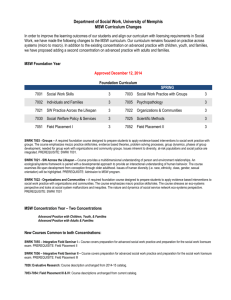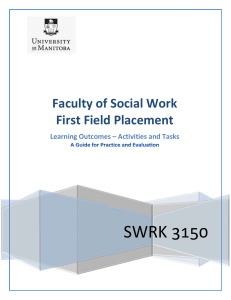The Program and the Degree
advertisement
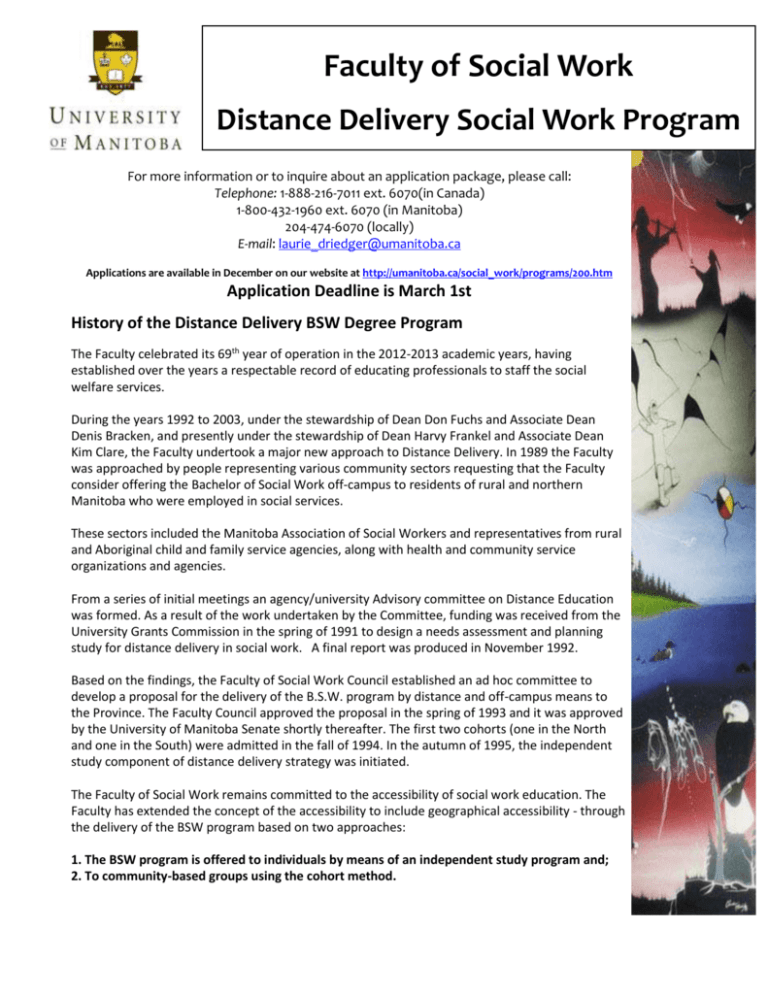
Faculty of Social Work Distance Delivery Social Work Program For more information or to inquire about an application package, please call: Telephone: 1-888-216-7011 ext. 6070(in Canada) 1-800-432-1960 ext. 6070 (in Manitoba) 204-474-6070 (locally) E-mail: laurie_driedger@umanitoba.ca Applications are available in December on our website at http://umanitoba.ca/social_work/programs/200.htm Application Deadline is March 1st History of the Distance Delivery BSW Degree Program The Faculty celebrated its 69th year of operation in the 2012-2013 academic years, having established over the years a respectable record of educating professionals to staff the social welfare services. During the years 1992 to 2003, under the stewardship of Dean Don Fuchs and Associate Dean Denis Bracken, and presently under the stewardship of Dean Harvy Frankel and Associate Dean Kim Clare, the Faculty undertook a major new approach to Distance Delivery. In 1989 the Faculty was approached by people representing various community sectors requesting that the Faculty consider offering the Bachelor of Social Work off-campus to residents of rural and northern Manitoba who were employed in social services. These sectors included the Manitoba Association of Social Workers and representatives from rural and Aboriginal child and family service agencies, along with health and community service organizations and agencies. From a series of initial meetings an agency/university Advisory committee on Distance Education was formed. As a result of the work undertaken by the Committee, funding was received from the University Grants Commission in the spring of 1991 to design a needs assessment and planning study for distance delivery in social work. A final report was produced in November 1992. Based on the findings, the Faculty of Social Work Council established an ad hoc committee to develop a proposal for the delivery of the B.S.W. program by distance and off-campus means to the Province. The Faculty Council approved the proposal in the spring of 1993 and it was approved by the University of Manitoba Senate shortly thereafter. The first two cohorts (one in the North and one in the South) were admitted in the fall of 1994. In the autumn of 1995, the independent study component of distance delivery strategy was initiated. The Faculty of Social Work remains committed to the accessibility of social work education. The Faculty has extended the concept of the accessibility to include geographical accessibility - through the delivery of the BSW program based on two approaches: 1. The BSW program is offered to individuals by means of an independent study program and; 2. To community-based groups using the cohort method. The Program and the Degree The Distance Delivery Social Work Degree Program is intended to target individuals who are employed in the social services and living outside the City of Winnipeg, but who may not have had the opportunity to pursue professional social work education. The Distance Delivery Social Work Degree Program intends to provide both a liberal Arts and professional education. It provides professional preparation for generalist practice in a variety of social work fields. The program is accredited by the Canadian Association of Schools of Social Work, and graduates from it are eligible for acceptance into schools of graduate studies. The BSW degree is accepted as a professional degree by the Manitoba Institute for Registered Social Workers and by the Manitoba Association of Social Workers, and holders of the degree are eligible for membership in these organizations. The Faculty is a charter member of the Canadian Association of Schools of Social Work. Both the Bachelor of Social Work and the Master of Social Work degrees are accredited by the Association, which is also recognized by the Council on Social Work Education in the U.S. The Faculty offers the undergraduate program at three locations and through Distance Learning. The three locations are: Fort Garry Campus, Inner City and the Northern Program based in Thompson. The Distance Delivery Social Work Degree Program is available for people living and working outside the City of Winnipeg. Access to high speed internet is required. Delivery methods for the independent study component of the program include a combination of independent study manuals, online study, and group based study. All course examinations are scheduled and arranged for in the student’s community by the University of Manitoba Registrar’s Office. Delivery of the program to the community-based cohorts utilizes the face-to-face delivery method with the option of using a combination of the face-to-face delivery methods, independent study methods and online study. Delivery options for the cohorts, which generally consist of 30 to 35 students, are negotiated with the communities and/or agencies involved. Examples of the delivery formats include five and six year plans in which students attend classes four or five days out of every month or two days every second week. An objective of the program is to meet the needs of the communities while maintaining academic integrity. Who Is Eligible? Applicants to the Distance Delivery Social Work Degree Program must meet all three requirements to be admitted into the program. 1. A minimum of two years of work experience, within the last five years, in the social services; 2. Residency outside the City of Winnipeg; and, 3. The University of Manitoba admission requirements for either a regular student or a mature student. Frequently Asked Questions What do they mean work as it means related to social services? The Profession of social work has emerged in the twentieth century as one of the major human services professions. The great complexity of life in our time has made it increasingly difficult for many individuals, families and population groupings to achieve a self-realization without professional help; it has also created the need for a service which helps social institutions to be attuned to human need. Thus the focus of social work responsibility is on the well being of people and the forces and conditions which undermine human dignity. In its practice, social work is involved in social treatment and social change. The Bachelor of Social Work (BSW) degree enables the graduate to practice as a professional social worker. Graduates may work in a number of areas: child welfare gerontology school social work social policy mental health community development public assistance health care employee assistance rehabilitation private practice family services cross-cultural social work corrections Social workers carry out a wide range of responsibilities within these areas. A sampling of these would include the following types of duties: Promoting community awareness in areas such as the criminal justice system, human rights, violence and abuse issues, etc.; Providing recreational, educational and counseling services to inmates in penitentiaries (and their families); Working with senior citizens in areas such as health care, community resources, elder abuse, legal aid, home care, housing, etc.; Program planning in personal care homes and school systems; Working with people with physical or mental disabilities in areas such as independent living, community resources, and legal aid; Working with the terminally ill and their families; Working with people/families coping with life stresses such as divorce, unemployment, death etc.; Child protection and abuse prevention, and; Providing individual, group and family counseling services to abused women and their children; Working together with minority, cultural and ethnic groups to develop programs which meet their needs; Working with employees in industrial settings; Planning and developing necessary community services, research social policies and issues and making recommendations for change; Working with and advocating for people requiring social assistance; and, Working with and advocating for people with AIDS/HIV and their support networks. Individuals who are considering a career in social work should be strongly committed to social justice and social change, and to a professional helping role. A mature outlook and personality, the ability to relate well to people and good verbal and written communication skills are also important. Social workers need to be able to think critically and to have a strong sense of personal integrity. Social workers come from a wide range of backgrounds; there is no single quality which makes a good social worker. If you are genuinely interested in the welfare of those with whom you will be working, are respectful of individual differences and choices, and do not discriminate on the basis of race, sex, age, sexual preference, religion, physical/mental ability, ethnicity, etc., social work may be the career for you. Many social service agencies have volunteer programs. Volunteer work at such agencies may give you an opportunity to increase your skills in working with people, as well as allowing you to observe social workers in action. I have been working for years do I still need to do a Field Placement? Yes Field instruction is a major part of the BSW degree program at the Faculty of Social Work. The field instruction program provides students with two opportunities to learn first-hand how to provide professional practice through a social service delivery system by undertaking educationally focused, progressively more demanding and complex professional social work interventions. Field instruction will be provided by University appointed (university or agency-based) field instructors who have expertise in the generic principles, knowledge, and skills that can be applied to a wide range of fields of practice. The method of instruction will include individual and/or group seminars designed to assist the student to integrate theory with practice. This instruction is provided on a weekly basis. Active participation is expected of the student in all phases of the field instruction program including during field orientation in their individual agency placements. These orientations are conducted at the beginning of the academic year. Students may be placed in a variety of appropriate agencies or departments as their field placement sites. These will include: schools, probation, gerontology, child, family, medical, mental health, occupational, disability focused, and ethnically sensitive services providing a variety of intervention skills with individuals, families, groups, communities and policy initiatives. Once the student has completed the prerequisite courses they will work with the Distance Delivery Field Coordinator to set up a field placement in their community. How long has this program been in existence? The Distance Delivery Social Work Degree Program was introduced in 1994 to allow individuals who are living in remote locations and who are employed in social services to complete the BSW Degree program. How are the courses taught? DISTANCE DELIVERY The Faculty of Social Work is committed to the accessibility of social work education and has developed the Bachelor of Social Work degree by Distance for people living and working outside of Winnipeg. The distance delivery of the Bachelor of Social Work degree is a collaborative effort between the Faculty of Social Work and the Distance and Online Education Program of the Extended Education Division. Students are involved in a variety of study methods, including: independent study manuals, online study group based audio-conference sessions There is an instructor assigned to your course that you can correspond with and receive feedback from. If you have access to the Internet, you can access Angel, which is a courseware package that allows students to check assignment grades online, download course manuals, or submit assignments using the optional assignment submission process. How long will this program take to complete? The program is designed for part-time study, enabling students outside of Winnipeg to complete an undergraduate degree while working in their communities. Completion of the B.S.W. on a full time basis generally takes four years; however, you will have up to nine years to complete the program. If students have received credits from other university programs, they can reduce the time it takes to complete the course. The total length of time it will take each individual to complete the program will depend on the circumstances surrounding each situation (i.e. total transfer credits, full or part time jobs, families, etc.). I have taken some University already. Can I transfer those credits into the program? At the point of admission our Admissions office will assess your submitted transcripts to see if any courses previously taken from other institutions are transferable into the program. Social Work credits can be transferred in from other accredited programs on an individual basis; however, our Admissions office must first assess the request to ensure that they meet our University transfer standards. If you have already completed a degree from an accredited educational institution, the Admissions office will grant you 51 credit hours, thereby satisfying the required elective hours needed to complete the program. Course Description The University of Manitoba Distance Delivery Social Work Degree Program The University of Manitoba B.S.W. Degree consists of one hundred and twenty three (123) credit hours. This includes: fifty-one (51) credit hours of electives, which are taken at the student’s discretion in terms of subject area, including a required Math elective course and a required written English elective course; and, seventytwo (72) credit hours of required social work courses. One full course is equivalent to six (6) credit hours. Students are allowed to transfer in up to fifty-one (51) credit hours of electives from their previous studies. The University Admissions office determines admissibility of these elective credits. Students who have taken social work courses at other universities have the opportunity to make a request to the Faculty of Social Work for equivalency within the six-month period following their acceptance into the Faculty of Social Work as a regular student. Students are given up to nine (9) years to complete their B.S.W. degree although the actual completion time may vary with individuals depending on such factors as the number of credit hours transferred in, work and personal circumstances, etc. The seventy-two (72) credit hours of social work courses include foundation courses, field and practices courses and theory courses. The foundation courses account for 15 credit hours and include the following four courses: SWRK 1310, SWRK 2080, SWRK 2090, and SWRK 3140. SWRK 1310 Introduction to Social Welfare Policy 3 credit hours Examination of social welfare policy as the end product of ideologies. Introduction of elements of ideology and the comparison of competing ideological systems. The relationship of economic, political and ethical views of society and their manifestation in societal responses to human need and social services. Students may not hold credit for both SWRK 1310 and the former 047.130. SWRK 2080 Interpersonal Communications Skills 3 credit hours A basic core of interpersonal skills for communicating effectively and for establishing and maintaining relationships in one-to-one and group situations. Emphasis is on experiential learning using a variety of techniques. SWRK 2090 Human Behavior and Social Work Practice 6 credit hours General systems theory is applied to the study of person-in-family environment, with a corresponding examination of implications for social work practice. Various models of human development are critiqued. Information sessions on human behavior critical to social work practice are provided. SWRK 3140 Introduction to Social Work Practice 3 credit hours Introduces students to ecological and other generalist-based practice frameworks and the role of professional social workers. Course emphasizes values and knowledge in context of a rational approach to problem solving which includes problem definition, assessment, contracting, intervention and evaluation. Pre- or co-requisite SWRK 1310, SWRK 2080 and SWRK 2090. Theory Courses consist of 21 credit hours and include the following courses: SWRK 2110, SWRK 3100, SWRK 3130, SWRK 4210 and SWRK4220 SWRK 2110 The Emergence of the Canadian Social Welfare State 3 credit hours An examination of the Canadian Social Welfare state from its various colonial inheritances to the Canada Assistance Plan. Social, political, economical, religious, geological, demographic, and cataclysmic factors influencing the development of welfare state are examined and analyzed. Pre-requisite: SWRK 1310. Students may not hold credit for both SWRK 2110 and the former 047.130. SWRK 3100 Systematic Inquiry in Social Work 3 credit hours Relates systematic methods of scientific inquiry to social work practice; theory building for practice; information collection; descriptive data for decision-making; understanding technical research material, introduction to issues of research design. SWRK 3130 Contemporary Canadian Social Welfare 3 credit hours An examination of social welfare in Canadian society, leading to an evaluation of present approaches in the light of changing economic and social conditions and changing needs. Pre-requisite: SWRK 1310. Students may not hold credit for both SWRK 3130 and the former 047.301. SWRK 4210 Feminist Perspectives on Social Welfare Practice 6 credit hours An analysis of social welfare practice and welfare policy from a feminist perspective. Course emphasizes the integration of social work intervention with policy in the social welfare context and overlays concepts such as empowerment, ecological practice, oppression, and practice in context of cultural diversity. Pre-requisites: SWRK 1310, SWRK 2080, SWRK 2090, and SWRK 3140. Students may not hold credit for both SWRK 4210 and SWRK4170 or SWRK 4210 and SWRK4190 SWRK 4220 Aboriginal People and Social Work 6 credit hours An analysis of social work practice and welfare policy from an aboriginal perspective. Course emphasizes the linkage between practice and policy and overlays concepts such as empowerment, ecological practice, and practice in context of cultural diversity. Pre-requisites: SWRK 1310, SWRK 2080, SWRK 2090, and SWRK 3140. Students may not hold credit for both SWRK 4220 and SWRK4160, or SWRK 4220 and SWRK4180. The field and practice courses account for 36 credit hours and include: SWRK 3150, SWRK 4120, and two sections of SWRK 4300. SWRK 3150 Field Instruction 12 credit hours A first educationally directed field experience in which the student will have the opportunity to assume responsibility for social work engagement, assessment, planning, intervention and evaluation, integrating theory from class. The required hours are calculated as 28 weeks x 2 days per week x 8 hours or 420 hours. This time commitment includes involvement with the agency in planning for, and engaging in, practice activity, and evaluation of performance. It also includes educational contact time with the field instructor in individual and/or group sessions. Pre-requisites: SWRK 1310, SWRK 2080, SWRK 2090, and SWRK 3140; Co-requisite: 6 credit hours of SWRK 4200. SWRK 4200/4300 Field/Focus of Social Work Practice 6 credit hours Seminar courses that teach social work practice skills in the context of a field or focus of practice. The courses emphasize practice as a planned change (client systems) and policy and linkage (service system). Pre-requisites: SWRK 1310, SWRK 2080, SWRK 2090, and SWRK 3140; 6 credit hours co-requisite with SWRK 3150 and an additional 6 credit hours co-requisite with SWRK 4120. Students cannot hold credit for both SWRK4150 and SWRK 4120. SWRK 4120 Field Instruction II 12 credit hours A second educationally directed practice experience building on SWRK 3150 in which the student will have the opportunity to carry a sustained professional role in situations which require the integration of values, knowledge, and skill at the level of a beginning professional practitioner. The required hours are calculated as 28 weeks x 2 days per week x 8 hours or 420 hours. This time commitment includes involvement with the agency in planning for, and engaging in, practice activity, and evaluation of performance. It also includes educational contact time with the field instructor in individual and /or group sessions. Pre-requisites: 6 credit hours of SWRK 4200 and SWRK 3150; Co-requisite: 6 credit hours of SWRK 4300. Canadian Association for Social Work Education (CASWE) Canadian Accredited Schools of Social Work Revised October 2008 cassw@cassw-acess.ca www.cassw-acess.ca Eastern Memorial University of Newfoundland Dalhousie University St. Thomas University University de Moncton UQAT UQAC Université Laval McGill University Université de Montreal UQAM UQAO Université de Sherbrooke Central Carlton University Université d’Ottawa Laurentian University/Université Laurentienne Lakehead University University of Toronto Ryerson University York University McMaster University Renison College (University of Waterloo) Wilfrid Laurier University King’s College (University of Western Ontario) University of Windsor Western University of Manitoba Nicola Valley Institute of Technology University of Regina First Nations University of Canada University of Calgary University of British Columbia University of British Columbia Okanagan University College of the Cariboo University College of the Fraser Valley University of Northern British Columbia University Of Victoria Note : Only schools from this list will be considered for Social Work course equivalencies. EQUIVALENCY Guidelines for the Granting of Equivalency Credit for Social Work Courses Taken outside the University of Manitoba Faculty of Social Work The Faculty of Social Work supports the principle of granting equivalency credit for social work courses taken in programs leading to a professional social work qualification at other educational institutions, or courses taken as part of a diploma or certificate offered at the University of Manitoba. (NOTE: Students will be required to provide proof of professional social work qualification along with descriptive and evaluative information outlined in Item 4.) The responsibility for assessing BSW equivalency for such courses will be assumed by the BSW Curriculum Committee. Students will be advised at the time of their acceptance to the BSW program of procedures to be followed if they intend to request BSW equivalency for courses taken previously. The request for consideration of equivalency transfer must originate with the student. Only social work courses taken in the last nine years will be considered for equivalency transfer. Requests for equivalency transfer will normally be considered only in the first six months after the student has been admitted into the Faculty. Students will be advised to provide the Faculty with descriptive and evaluative information related to courses. Information should include: a) Calendar description of the courses and program; b) Course outlines, assignments and bibliographies; c) Evaluative feedback (in the case of a field practicum, this would include a written evaluation by the field instructor) Students who are refused social work equivalency may initiate a challenge for credit, but only for those courses that are open to challenge. Application for consideration shall be made to the Admissions Office, Room 424 University Centre. The BSW Committee Chair will be consulted by the Student Services and Admissions /Advising. Equivalency credit for Field Instruction and Field/Focus courses: Equivalency shall not be granted for SWRK 3150 or SWRK 4120. The Faculty of Social Work will not entertain requests for consideration for equivalency transfer for the SWRK 4200 which is co-requisite to SWRK 3150 and/or SWRK 4120. Passed by B.S.W. Curriculum Committee March 9/99 Passed by Faculty Council March 26/99 CHALLENGE FOR CREDIT POLICY The Faculty of Social Work at the University of Manitoba provides a social work education in keeping with its mission statement and the standards of the Canadian Association of Schools of Social Work, whereby academic instruction and closely supervised field experiences are combined to ensure that students acquire the values, knowledge and skills necessary for BSW level practice. The Faculty also recognizes that these components, in some instances, are acquired outside the traditional educational system, through work experience and/or classroom experience from other disciplines. The Faculty of Social Work accommodates those students who are qualified and who can demonstrate an acceptable level of knowledge and skill, by allowing them to challenge certain social work courses. The objective of the Challenge for Credit Policy is to maintain the high level of BSW education for which the Faculty is distinguished. In this regard, evaluation methods have been devised to assure that challenge students possess the values, knowledge, and skill expected at the exit level of the course as it is commonly taught and to assist qualified students to undertake an academic program which is sensitive to their individual circumstance. The courses offered for challenge are those which the Faculty believes could reflect the individuals’ previous experiences both through formal and informal education. Courses available for Challenge for Credit SWRK 2080 - Interpersonal Communication Skills (3 credit hours) SWRK 3100 - Systematic Inquiry in Social Work (3 credit hours) SWRK 3130 - Contemporary Canadian Social Welfare (3 credit hours) No course which appears on a student’s transcript as a previously failed attempt may be challenged. Challenge for credit is only available to students registered in the BSW and Pre MSW program of the Faculty of Social Work at the University of Manitoba. Methods of Assessment for Challenge for Credit Courses SWRK 2080 Interpersonal Communication Skills In order to challenge for credit in SWRK 2080 a student will provide for evaluation three of the assignments common to all SWRK 2080 courses across sites at the University of Manitoba, Faculty of Social Work. (1) The student will provide a one hour videotape of themselves in a social work interview, illustrating communication skills. (2) The tape will be accompanied by a written evaluation of their work. There are written guidelines/expectations for both the videotape and the evaluation paper. (3) The other expectation is a values paper which shows student awareness of and exploration of their own values and social work values. Written guidelines will accompany the challenge for credit package. SWRK 3100 Systematic Inquiry in social Work—Choice of method is at the discretion of the instructor. 1. Final Examination which covers the entire course content 100% OR 1. Final Examination which covers the entire course content 50% 2. A research plan assignment 50% SWRK 3130 Contemporary Canadian Social Welfare—Choice of Method is at the discretion of the instructor. 1. Final Examination which covers the entire course content 100% OR 1. Final Examination which covers the entire course content 50% 2. Paper 50% Passed by B.S.W. Curriculum Committee March 9/99 Passed by Faculty Council March 26/99 The University of Manitoba Faculty of Social Work Distance Delivery Social Work Degree Program 521 Tier Building Winnipeg MB R3T 2N2
